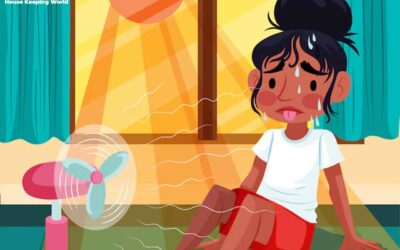Heat waves can occur in the summer in regions of the nation where temperatures are typically lower. Since many of the residences in these communities lack air conditioning, it becomes difficult for everyone to survive the intense heat. Even if your home has air conditioning, you may still stay cool during a heat wave by following these measures. Here are a few tips for Dealing With a Heat Wave Without Air Conditioning.
Remember to maintain an adequate level of hydration
It’s important to be well-hydrated, so you’ll need to drink more water than you normally do in the heat wave season. You should also replace electrolytes if you’re sweating a lot. You can do this by drinking electrolyte replacement beverages or by having a small meal with your water. Since thirst is the initial symptom of dehydration, you should consume enough fluids before you experience thirst to avoid being dehydrated.
Utilize ceiling and box fans to encourage airflow throughout your house
As a sort of “exhaust” system, opening doors within the house and utilizing box fans to force hot air outside can bring cooler evening air within. Open all of the windows and encourage as much airflow as you can during the evenings. To extend the duration of the indoor temperature, shut all doors, windows, curtains, and blinds as soon as the sun rises. Restart the fans and open the windows when the outside air cools down to a lower temperature than inside, which is normally in the evenings or at night.
Take advantage of the cooling power of water
Fill basins or buckets, then soak your feet. Applying moist towels or bandannas to the head or shoulders might provide a cooling sensation. Enjoy cool baths or showers and think about spritzing yourself with cool water from a spray bottle throughout the day.
Go downstairs
A home’s higher floors will always be warmer than its ground floor because hot air rises. A cool haven from the midday sun can be found in a basement.
Remove any other sources of heat
Computers and gadgets that are left running can produce extra heat, as can incandescent light bulbs. Consume fresh food that doesn’t need to be cooked on the stove or in the oven.
Avoid alcoholic beverages and caffeine
Steer clear of caffeine and alcohol since they both have urinating effects that might cause dehydration.
Homemade “air conditioning” system
To create a DIY “air conditioning” system, place yourself in front of a box fan pointed at an open cooler or an ice-filled pan.
Try to visit public buildings with air conditioning
If the heat gets too much, try to attend public facilities that provide air conditioning during the warmest parts of the day. Movie theaters, shopping centers, and libraries can all be great locations for relaxing.
Don’t eat large, protein-rich meals
Eat small, protein-rich meals to avoid warming the body and raising metabolic heat.
Be able to recognize the symptoms of heat-related illnesses
Know the signs of heat-related illnesses and heat-related problems, such as cramps, rash, exhaustion, and heat stroke. In the event of a heat emergency, dial emergency help and attempt to keep the person cool until assistance comes.
Pets also suffer when the temperature rises
Finally, keep in mind that when the temperature rises, pets also suffer. Giving dogs, cats, and rabbits a “cool” wash or shower will help regulate their body temperature. The animal can also be cooled by placing a cool towel or washcloth over its skin next to a fan or by lying on a cool towel on a tile floor. Ascertain that they can also consume an ample amount of cold water. Pets experiencing a heat stroke may:
fast breathing,
drooling,
wide eyes,
heated skin,
quivering muscles,
vomiting and a confused expression.
If you suspect a heat stroke in your pet, contact your veterinarian.

Image From Freepik
